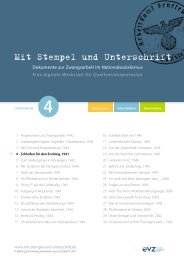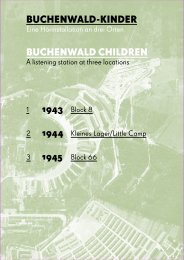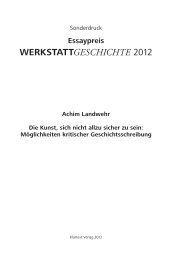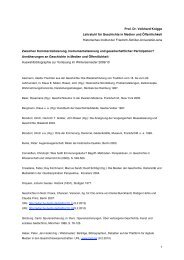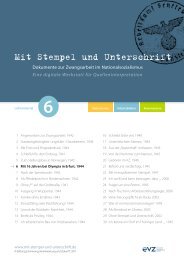Sharing Memories of Protest and Resistance
Sharing Memories of Protest and Resistance
Sharing Memories of Protest and Resistance
You also want an ePaper? Increase the reach of your titles
YUMPU automatically turns print PDFs into web optimized ePapers that Google loves.
Who participated? · 57<br />
Verena Hörl<br />
Born 1985 in Baden-Baden, Germany<br />
University student (Faculty <strong>of</strong> Law, Albrecht<br />
Ludwigs University, Freiburg i. Brsg.)<br />
To analyse the way protest is remembered, one<br />
must start with a lot <strong>of</strong> questions. For instance, the<br />
peace marches in European countries – like during<br />
the Vietnam War, the 1990–91 un-Iraq War, the<br />
2003 us-Iraq War – raise the question about transnational<br />
connections between protests. The disturbances<br />
in France in October 2005 as well as the “No”<br />
votes against the eu constitution can be seen as<br />
protest movements that raise questions about European<br />
integration, identity <strong>and</strong> solidarity. Through<br />
the project “Remembering <strong>Protest</strong>, <strong>Resistance</strong>, Civil<br />
Disobedience,” I want to find out: How are social<br />
movements <strong>and</strong> democratic processes interrelated?<br />
How do trans-national exchange <strong>and</strong> national contextualization<br />
<strong>of</strong> protest cultures take place?<br />
Liliana Iuga<br />
Born 1985 in Cluj-Napoca, Romania<br />
University student (Faculty <strong>of</strong> History <strong>and</strong><br />
Philosophy, Babeş-Bolyai University,<br />
Cluj-Napoca)<br />
I like studying local history <strong>and</strong> talking with people<br />
involved in various historical events, because I think<br />
history is first <strong>and</strong> foremost about people, not about<br />
politics, economy <strong>and</strong> wars. The perceptions <strong>of</strong> eyewitnesses<br />
help me better underst<strong>and</strong> the events I am<br />
studying. This project will give me the opportunity<br />
to speak to people, to hear their memories <strong>and</strong> thus<br />
to better underst<strong>and</strong> the past. Comparing the situation<br />
in Romania with similar experiences in other<br />
countries will open new perspectives. And then there<br />
are no more distances between us – it is a world<br />
without limits, at least for communication.<br />
Kalina Kirilova<br />
Born 1984 in S<strong>of</strong>ia, Bulgaria<br />
University student (Faculty <strong>of</strong> Social Sciences,<br />
University <strong>of</strong> Mannheim)<br />
<strong>Resistance</strong> <strong>and</strong> opposition are the very substance <strong>of</strong><br />
youth. Being young is about opposing <strong>and</strong> rebelling<br />
against established rules <strong>and</strong> <strong>of</strong>ficial norms. My<br />
generation lives at the crossroads <strong>of</strong> history – where<br />
old barriers <strong>and</strong> straightjackets have been destroyed,<br />
but new norms <strong>and</strong> rules have not yet been<br />
established. For us, the natural tendency <strong>of</strong> youth<br />
to criticize, oppose <strong>and</strong> rebel against anything<br />
that is established coincided with the destruction<br />
<strong>of</strong> all foundations <strong>of</strong> the “old world,” with uncertainty<br />
<strong>and</strong> at times wild swings towards all that is<br />
opposite.<br />
Verena Hörl<br />
Tina Ilc<br />
Tina Ilc<br />
Born 1988 in Šempeter pri Gorici, Slovenia<br />
High-school student (Šk<strong>of</strong>ijska gymnasium<br />
Vipava)<br />
Throughout history, people have sensed when the<br />
authorities no longer represented their will. That<br />
was when they decided to use their own power to be<br />
heard <strong>and</strong> to change the situation. There are various<br />
reasons why a group chooses protest. Some are<br />
reasonable <strong>and</strong> some might not be, but there is one<br />
common truth: people have a right to be heard. It<br />
might sound paradoxical, but protest is somehow<br />
a part <strong>of</strong> democracy. That is why I think that if we<br />
want the eu to function as a democratic union, we<br />
have to analyse <strong>and</strong> discuss our common history so<br />
that we will be able to work toward our common<br />
future.<br />
Liliana Iuga<br />
Anete Jēkabsone<br />
Anete Jēkabsone<br />
Born 1986 in Riga, Latvia<br />
University student (Faculty <strong>of</strong> Political Science,<br />
Stradinu University, Riga)<br />
If we want to learn about resistance <strong>and</strong> disobedience<br />
in Europe, the experience <strong>of</strong> Latvia in this<br />
context is quite unique: The events that changed<br />
our state from a totalitarian regime to a democracy<br />
took place only 16 years ago, involving almost<br />
everybody in non-violent action as in the Baltic in<br />
1989 <strong>and</strong> in the “Song Revolution” in Latvia. In this<br />
project I wish to collect information from eyewitnesses,<br />
to meet the people behind the facts. To hear<br />
<strong>and</strong> underst<strong>and</strong> life stories from different countries,<br />
to become aware <strong>of</strong> the diversity <strong>and</strong> at the same<br />
time the similarity <strong>of</strong> these stories, helps guarantee<br />
tolerance <strong>and</strong> underst<strong>and</strong>ing. This is a process in<br />
which I would like to take part.<br />
Mihails Kozlovs<br />
Kalina Kirilova<br />
Mihails Kozlovs<br />
Born 1986 in Daugavpils, Latvia<br />
High-school student (Russian Liceum,<br />
Daugavpils)<br />
Working on an Internet platform will connect us,<br />
the participants in “Remembering <strong>Protest</strong>, <strong>Resistance</strong>,<br />
Civil Disobedience,” for half a year. This will<br />
foster our underst<strong>and</strong>ing <strong>of</strong> each other because<br />
we will not only undertake research in our own<br />
environment, but also discuss our work <strong>and</strong> the<br />
problems we confront in our countries. Thus we will<br />
embrace all Europe. Obviously the Internet platform<br />
improves conditions for our research, which will<br />
be done step by step. I consider such meetings for<br />
young Europeans increasingly important in a globalized<br />
world. Dialogue helps improve our underst<strong>and</strong>ing<br />
<strong>of</strong> our differences <strong>and</strong> peculiarities.



